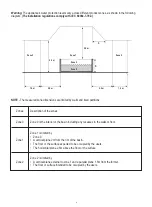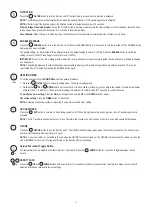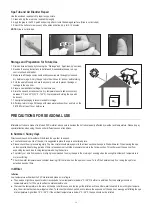
8
FIRST USE AND SETUP PREPARATION
1. Plug the machine into the mains.
2. Press the
RESET
button on the PRCD. The indicator turns red.
3. Press the
TEST
button on the PRCD. The red color shown on the indicator should disappear. Otherwise the PRCD is faulty. Do not use the spa if the spa
is faulty. Contact a qualified electrician to correct the fault.
4. Press the
RESET
button on the PRCD again. The indicator should turn red. When it does, the spa is ready for use.
PRCD Testing
Risk of electric shock: This product is provided with a PRCD located at the end of the power cord. The PRCD must be tested before each use. Do not
use the spa if the PRCD does not function properly.
Disconnect the power cord until the fault has been identified and corrected. Contact a licensed electrician to correct the fault. There are no serviceable
parts inside the PRCD. Opening the PRCD will void the warranty.
!
WARNING
Spa Control Unit Connected External Equipotential Bonding Conductors
A qualified electrician should wire the spa control unit to the household equipotential terminal using a minimum 1.5mm² solid copper conductor.
1.
2.
RESET
TEST
RESET
Indicator
TEST
3.
RESET
TEST
√
Do not use faulty
sockets or plug
boards.
The spa can be installed indoors or outdoors in around 10 minutes by one or more persons. For household use only.
The spa must be set up on a flat, smooth and supporting surface that is able to bear the maximum load of the filled spa with the listed maximum number
of occupants. Check with a qualified contractor or structural engineer to verify the requirement.
Make sure the area is free of sharp objects under or around the spa. Uneven or unsound surface can damage the spa and void your warranty. Level the
surface before filling the spa with water.
Provide an adequate drainage system around the spa to deal with overflow water and splashes. Provider a convenient water supply for filling the spa
that complies with any local water regulations, and whose parameters shall be adjusted with the requirements of the water treatment section.
Make sure there is enough clearance around the spa for full access to the equipment for maintenance and/or servicing.
Consider positioning the spa to minimize noise disturbance as much as possible.
●
●
●
●
●
●
●
●
●
●
●
Site preparation and requirements
Humidity is a natural side effect of indoor spa installation. The room must be properly ventilated to allow moisture to escape. Install a ventilating system
to prevent excess condensation moisture in the room.
Ensure the spa can be removed from the building without destroying any part of the built structure.
Consider any local regulations on these topics.
Consider not to install the spa on carpet or other floor materials that promote or harbor moisture and bacterial, or that could be affected by water
treatment chemicals used in the spa.
●
●
●
●
Additional requirements for indoor installation
Do not set up the spa on grass or dirt, as this will increase the amount of debris entering the spa and will damage the floor.
To ensure a longer lifespan, do not leave the spa tub exposed to direct sunlight.
Always keep the manometer within the yellow section when using the spa at a temperature higher than 20°C (68°F) or when exposing it to sunlight for a
short time.
Do not install or use the spa outdoors at a temperature lower than 4°C (39°F). Do not use the spa when the water inside the circulation system, pump,
or pipework is frozen. Put a heat preservation mat (optional accessories) between the base of the spa and the ground to prevent heat loss from the
bottom of the spa and to provide better heat retention.
Consider local environmental conditions, such as ground water and risk of frost.
Additional requirements for outdoor installation


















